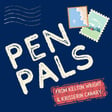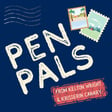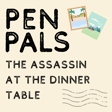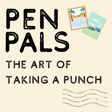
Book Battles: Genres, Trends, and IP Theft
Krisserin celebrates completing her manuscript while Kelton makes significant progress on her novel. They tackle the challenging questions of where your book belongs in the literary marketplace, whether to read in your genre while writing, and how to position your work among similar titles. The hosts dive into Lynne Freeman's IP theft lawsuit against bestselling author Tracey Wolff and Wolff's agent Emily Sylvan Kim of Prospect Agency, discussing its implications for writers. Plus, they debate the importance of comp titles, and answer listener questions about writing motivation and organization tools. Join them for an honest conversation about navigating the competitive world of publishing without losing your creative vision.
Write to us:
officialpenpalspod@gmail.com
Follow us:
Instagram: @penpalspod
TikTok: @penpalspod
Music by Golden Hour Oasis Studios



